Europe could be on the verge of getting a new right-wing populist-led government in the Netherlands, but forming a governing coalition is set to be a mammoth task. Here are the key players.
Veteran populist Geert Wilders, who has lived under constant police guard for decades because of the threat to his life by radical Islamists, now leads the largest party in the Netherlands but — typically for European politics — doesn’t have enough seats to govern alone. While the leaders of several other parties said in the run-up to the vote they wouldn’t cooperate with the anti-Islamification campaigner those remarks were made with an eye on getting as many votes for themselves as possible, and as Wilders himself said in the wake of the shock results, the time for finding difference is now over.
There are several possible outcomes now ahead of the country, long thought of as one of Europe’s most liberal, which has now experienced a significant shift to the right in the wake of over a decade of globalist government under Prime Minister Mark Rutte. At first glance, a right-wing coalition featuring Wilders in some capacity may seem most obvious, but a left-centrist power grab is technically feasible, particularly if things drag on. A minority right-wing government supported on a supply-and-demand basis is also possible, if not ideal, and a stalemate could even be resolved with another election.
Not that any of these will necessarily come soon. Government-building progresses at a pace that appears glacial to foreign observers, those from Britain for instance, accustomed to decisive election outcomes and governments rising and falling in the blink of an eye. The last Dutch government took a record-breaking 299 days from election to agreement to form, as the results left the leader with no clear path to government and a host of smaller parties competing to have their pet policies written into the paper.
On the face of it, finding a coalition shouldn’t be too difficult: a three-party agreement with the centre-right-globalists would be more than enough to get Wilders’ over the 76-seat threshold in the 150-seat lower house. Yet they are being extremely coy, which may throw Wilders onto the mercies of the small parties. Building a coalition out of every party that might conceivably back him — that is to say, anyone except the left — could take Wilders to 76 seats, the bare minimum.
Part of the coalition-building process in the Netherlands is the appointment of a ‘scout’ — an ally to the leader of the larger party who will do the leg work of going between potential partners looking for areas of common ground that could grow into an agreement. After an initial controversy over his first pick for scout, Wilders has now tipped now-retired veteran left-wing lawmaker Ronald Plasterk to act for him, calling him a “a creative spirit who will do a good job”.
Plasterk said per a NOS report that he was surprised to be asked, but “when the country calls, you have to have good reasons to say no.” As noted in De Telegraaf, while former government minister Plasterk remains a member of the Dutch Labour Party he is considered a rebel and frequently criticises its policies in his columns in that same conservative newspaper.
Now a new scout has been appointed — and apparently well received by most political parties, except those from the hard left — the factions Plasterk will be consulting are, in size order:
The Party For Freedom / Partij voor de Vrijheid (PVV) — 37 seats
Geert Wilders’ Party for Freedom has been a large, if sidelined force in Dutch politics for decades after he left the establishment VVD in opposition to its policy of supporting Turkey joining the European Union. After a brief stint supporting a minority right-wing coalition government from 2010, Wilders has been effectively frozen out of government, subjected to a so-called “cordon sanitaire” meaning despite him consistently leading one of the largest parties in the country he’s been snubbed by the other leaders.
Essentially treated as a persona non-grata, right-wing parties have preferred to cooperate with liberals than allow Wilders near government.
This dynamic has shifted considerably now Wilders leads the single-largest party with the largest seat share of any Dutch election for decades. The traditional establishment parties have received their worst results in decades, too: all of this makes Wilders impossible to ignore.
Although Wilders is best known for his strident anti-Islamification rhetoric and opposition to mass migration and the European Union — he supports a ‘Nexit’ for the Netherlands, Brexit style — he has been moderating his language in recent months and now having won the election promises to be a Prime Minister for all Dutch. This, coinciding with widespread outrage and horror at the Hamas terror attack on Israel and the pro-Gaza protests that followed in many European cities which seriously boosted pro-Israel Wilder’s poll ratings are major contributing factors to the breakthrough electoral success.
Moderated stances or not, it isn’t yet clear what precisely the PVV will want out of a coalition government. It is widely considered that other parties acting coy now could be a negotiation tactic to maximise what they could get out of a future coalition agreement, but if parties like the VVD really are reluctant to back a Wilders government, could he end up a junior coalition partner despite his party having the most seats? Punished at the ballot box or not, the VVD could argue the PVV lacks governing experience and needs time to learn from experienced establishment. Don’t expect Wilders or the voters to respond well to such patriarchal power plays.
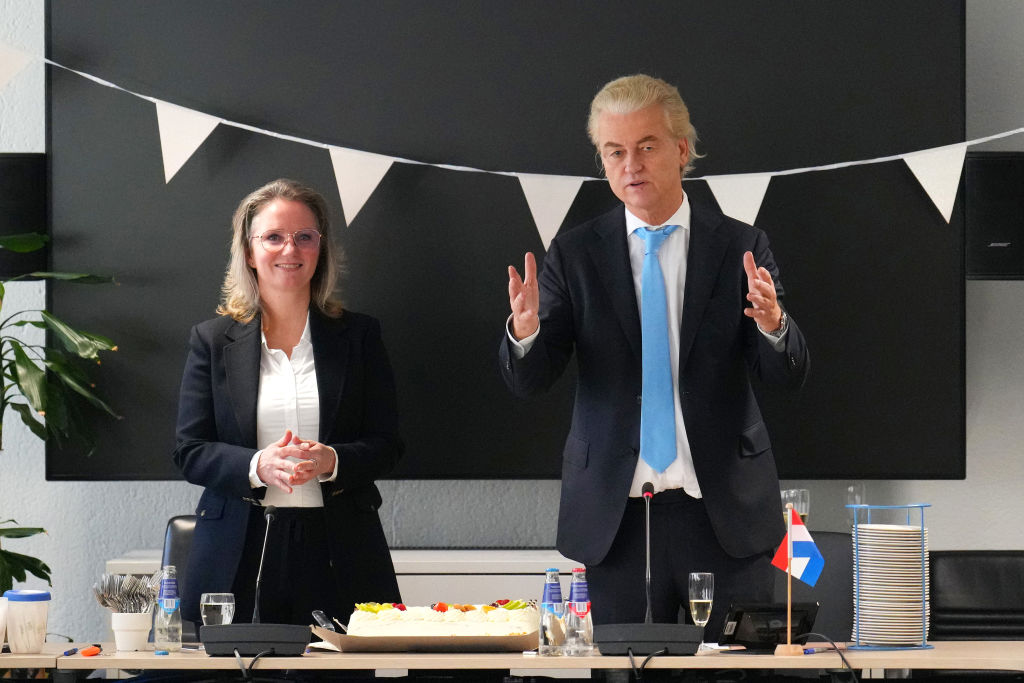
THE HAGUE, NETHERLANDS – NOVEMBER 23: Geert Wilders (blue tie), the leader of the Dutch Party for Freedom (PVV), stands next to Dutch MP Fleur Agema (L) as he delivers a speech at a post-election meeting at the Nieuwspoort conference centre after his party’s victory in yesterday’s general election, on November 23, 2023 in The Hague, Netherlands. (Photo by Carl Court/Getty Images)
Freedom and Democracy Party / Volkspartij voor Vrijheid en Democratie (VVD) — 24 seats
Should be thought of as the Conservative Party of the Netherlands: nominally right-wing but characterised by a strong globalist, open-border streak. Led by WEF favourite and Great Reset booster Mark Rutte since 2006, the party under Rutte has ruled the Netherlands under various coalitions since 2010.
Perhaps the biggest news story in the Netherlands post-election is the will-they-won’t-they drama over whether the VVD will actually support Wilders’ PVV now they’ve been knocked off their perch. While new leader Dilan Yesilgöz joined other centre-right party leaders to dismiss the possibility of working with Wilders before the election — she refused to answer the question, in fact, because she claimed it was too fanciful to consider Wilders being in a position to form a government — she is unique in sticking to that position post-vote.
Excuses for this have varied, including saying the Netherlands deserves a fresh start without her party after 13 years in power. But the position is one that is coming under increasing pressure and criticism, with several observers noting the last Dutch government collapsed because the VVD couldn’t get its coalition partners to agree with its new policy of introducing migration controls. Now it is in the position to actually do something about migration — by partnering with the strongly pro-borders PVV — the party has suddenly changed its mind, an act of hypocrisy, the criticism says.
Wilders hit out at the VVD for withdrawing before there had even been a chance to hold negotiations, and said they were letting down their own voters. The VVD leadership has come under criticism from its own members for refusing to join the government as well, with De Telegraaf reporting insiders writing: “Why make a decision now? There is a new right-wing political landscape with two clear winners. The voter has spoken and as a VVD you have a large mandate. First listen and talk instead of playing a game of strategy… Putting all the cards on the table now is careless and does not do justice to the situation.”
For now, Yesilgöz says she would consider supporting a minority government without joining it, but this would produce an unstable government. Whether her present position of refusal is simply a power play to extract more concessions out of Wilders in return for a place in government is yet to be seen, and will likely be the major factor of negotiations in the coming weeks and months.
The VVD leadership is due to meet on Wednesday night (November 29th) to discuss their position, which appears to be tearing the party apart. Like the Conservative party in the UK VVD is a broad, catch-all church and has a wing that thinks it is unconscionable to turn down a right-wing coalition that can fix the migration issue now. The other is horrified at the thought and would rather go into coalition with the second-place left-greens. As reported, both sides consider it a resigning matter. Expect some fireworks, whatever happens.
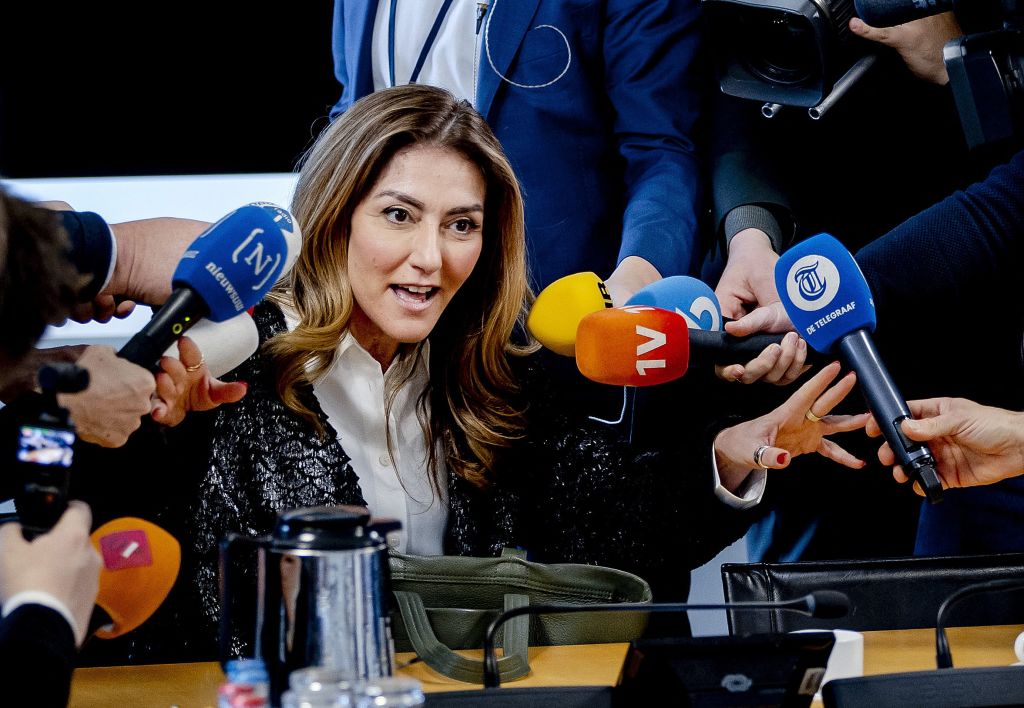
Leader of the People’s Party for Freedom and Democracy party (VVD) Dilan Yesilgoz speaks to the press during a meeting a day after the House of Representatives elections, The Hague on November 23 2023. (Photo by REMKO DE WAAL/ANP/AFP via Getty Images)
The New Social Contract / Nieuw Sociaal Contract (NSC) — 20 seats
Pieter Omtzigt’s NSC was only founded this year but already has 20 seats, an indication of how quickly politics can change outside of a two-party system. Founded from a split from the Christian Democrats, the NSC shares some views with PVV but has distanced itself from him on tone, saying some of Wilders’ comments border on unconstitutional. Mainly focussed on reforming the state to be more effective, the NSC has a wide anti-establishment streak but is in favour of more border control.
The NSC is in favour of the European Union but wants to reform it to become more accountable and democratic.
While Omtzigt also denied the possibility of a Wilders coalition before the vote, now the results are in he has shown himself to take a very pragmatic approach and is clearly willing to enter into discussions while criticising VVD for their obstinacy.
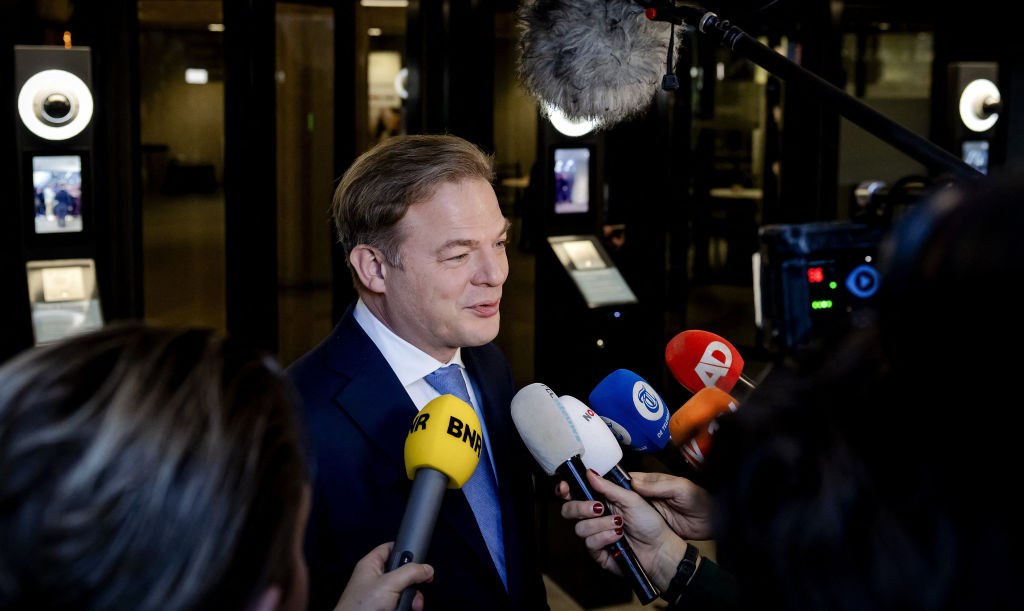
Leader of the New Social Contract (NSC) Pieter Omtzigt speaks to the press before a meeting with party leaders in the House of Representatives in The Hague, on November 28, 2023. (Photo by Robin van Lonkhuijsen / ANP / AFP) / Netherlands OUT (Photo by ROBIN VAN LONKHUIJSEN/ANP/AFP via Getty Images)
The Farmer-Citizen Movement / BoerBurgerBeweging (BBB) — 7 seats
It is almost without question that the pro-agriculture, anti-globalist Great Reset, anti-European Union populists of the BBB will join Wilders’ coalition. The party’s leader Caroline van der Plas, who gave the Dutch establishment, Mark Rutte, and the European Union such a bloody nose in the country’s local elections this year has been active speaking out against the coy attitude of the VVD.
The establishment party “learned nothing” from the events of this year by now refusing to join in government as a junior partner, van der Plas has said, saying it is more interested in party politics than delivering for what citizens want.
The fact the BBB has a big group in the Senate also benefits any coalition government if they are on board as it will make getting bills past the upper house. Despite its relatively small seven seats, van der Plas could end up being a decisive voice in Dutch politics from within the government.
Fun fact: in a small shout-out to her agricultural and pro-food voters, party leader van der Plas wears a livestock ear tag on her necklace to Parliament.
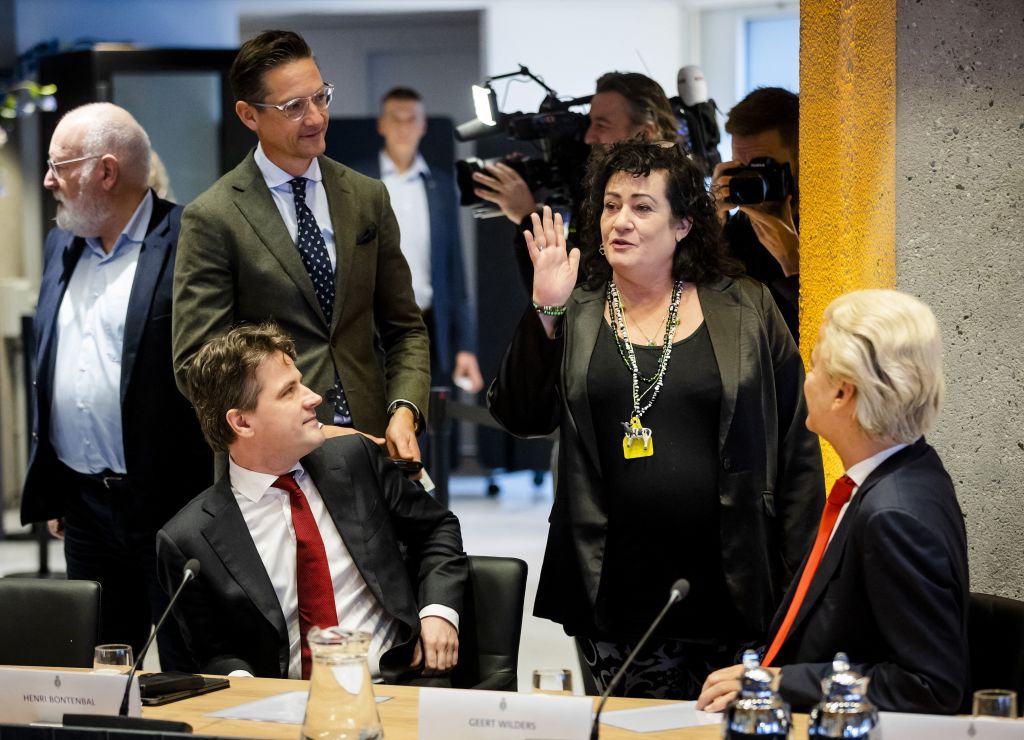
From left: GroenLinks-PvdA’s leader Frans Timmermans, leader of the Ja21 Joost Eerdmans (standing), Christian Democratic Appeal (CDA) Henri Bontenbal (seated), leader of the FarmerCitizen Movement (BBB) Caroline van der Plas, and leader of the Party for Freedom (PVV) Geert Wilders attend a meeting with Speaker of the House at the House of Representatives in The Hague, on November 24, 2023. (Photo by SEM VAN DER WAL/ANP/AFP via Getty Images)
Christian Democratic Appeal / Christen-Democratisch Appèl (CDA) — 5 seats
Incredible to think not so long ago the CDA was the largest party in the Netherlands and now they bump along with the almost-rans, not unlike the Liberal Democrats of the United Kingdom.
The smaller parties will only come into their own is the VVD really refuses to play ball — but there’s every chance Wilders will seek to bring them on board as a security measure in case Yesilgoz walks out later, hoping to bring down a Wilders government and benefit at a snap election.
The CDA took a body blow when one of its most prominent members, Pieter Omtzigt walked out and founded the NSC, which is now the fourth-largest party in the country. How nicely the CDA would play with their former bedmates the NSC may be a factor in whether they end up in any coalition.
Forum For Democracy / Forum voor Democratie (FvD) — 3 seats
FvD Thierry Baudet was attacked by left-wing extremists several times in the run-up to the election, including the most recent where he was beaten around the head with a beer bottle and had to be admitted to hospital. Consequently, the FvD have said they want to see Antifa declared a banned terrorist organisation and perhaps this would be a demand in coalition discussions.
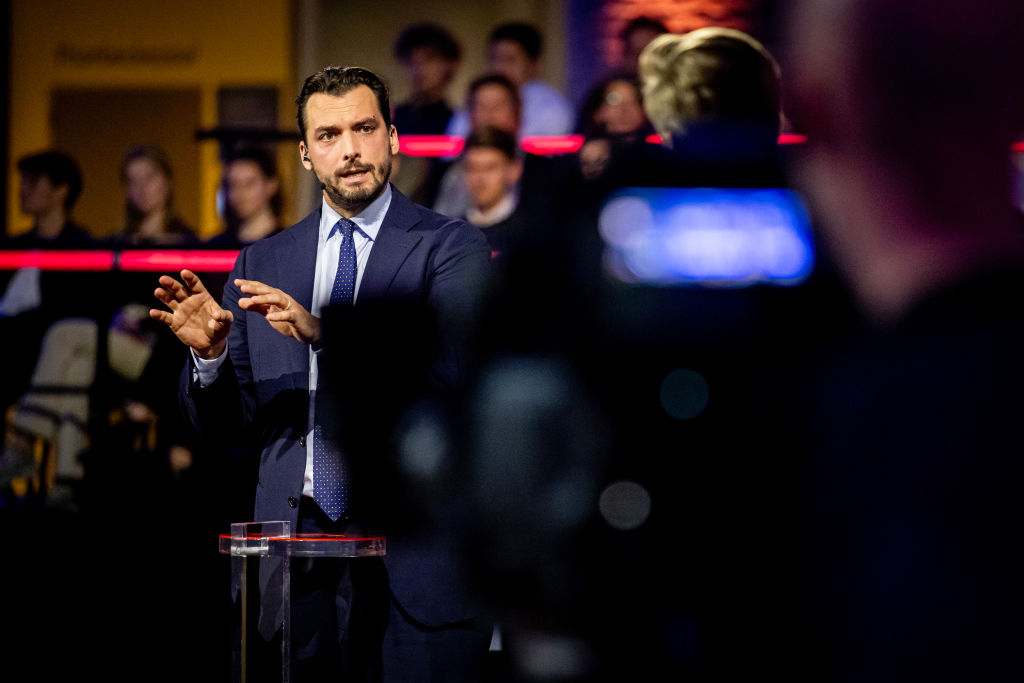
THE HAGUE, NETHERLANDS – NOVEMBER 21: FvD leader Thierry Baudet is seen during the Final Debate the night ahead of the Dutch General Elections on November 21, 2023 in The Hague, Netherlands. Voters go to the polls on November 22 in a snap general election called two years early. (Photo by Patrick van Katwijk/BSR Agency/Getty Images)
Reformed Party / Staatkundig Gereformeerde Partij (SGP) — 3 seats
Another Christian party — the SGP is a Christian-Right Calvinist group dating back over a century. Given their strong orthodox principles, the SGP “believes the country should be governed ‘entirely on the basis of the ordinances of God as revealed in the Holy Scriptures’”, including opposing feminism and LGBT politics. Its former leader, who was considered an institution in The Hague where he was a member of Parliament for a mammoth 29 years was known to complain that other members disrespected the nation by turning up to work so shabbily dressed and avoided appearing on the un-Godly television.
JA21 — 1 seat
Formed after splitting from FvD in 2020, claiming Thierry Baudet was too extreme. Just one seat but could be necessary if VVD refuses to play ball. But if JA21’s Joost Eerdmans felt motivated to split with FvD so recently, could they be persuaded to govern alongside them in a grand coalition?
Spare a thought for… GronenLinks
Frans Timmermans, a former Vice-President of the European Commission probably felt he was returning to a coronation at The Hague. Probably one of the best-known names in Dutch politics and a powerful mover and shaker in Brussels, the Eurocrat does not appear to have reacted well to his surprisingly distant second place with 25 seats. The left-wing Green Party’s merger with the left party was supposed to create an electoral juggernaut in the Netherlands, ending a split on the left, and while it is now larger than its traditional opposition the VVD, there’s no getting away from the fact the Netherlands voted overwhelmingly right this month.
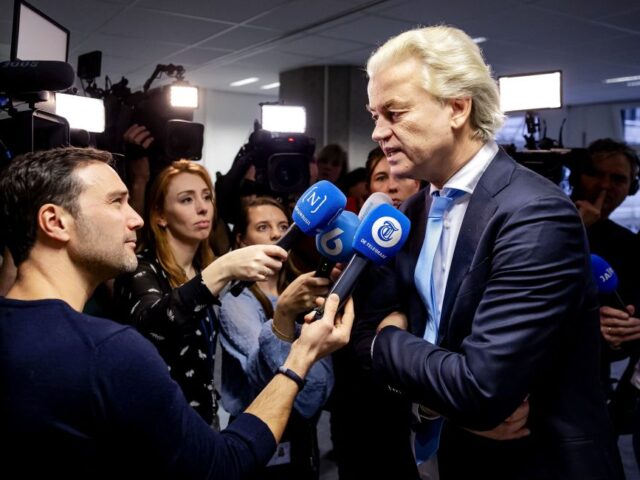
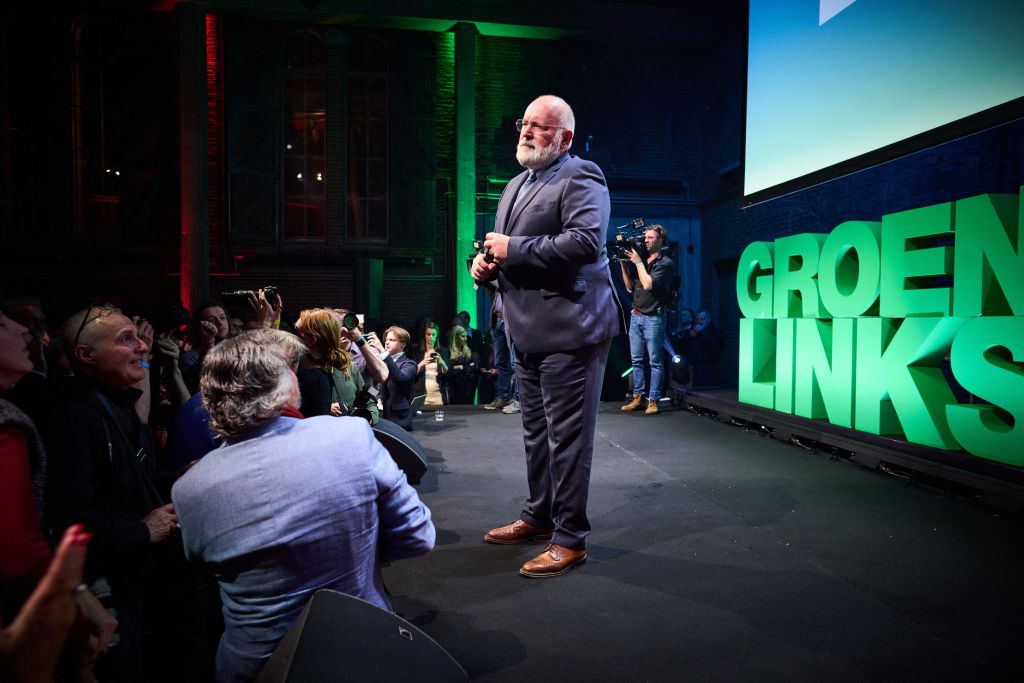
COMMENTS
Please let us know if you're having issues with commenting.